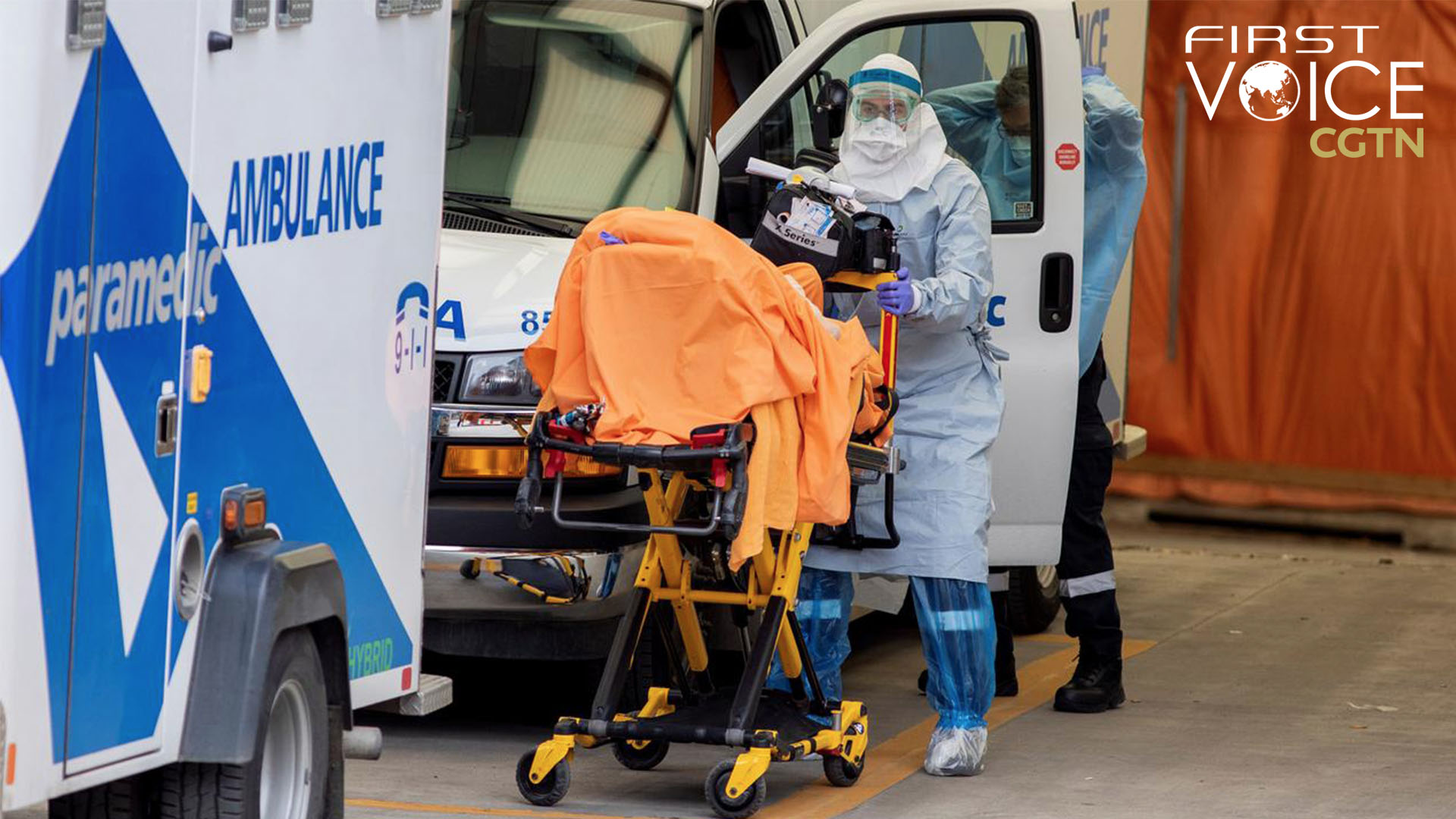
Editor's note: CGTN's First Voice provides instant commentary on breaking stories. The daily column clarifies emerging issues and better defines the news agenda, offering a Chinese perspective on the latest global events.
The global COVID-19 pandemic is the worst to strike the world since the so-called Spanish flu outbreak that started in 1918. In the century since then, there have been amazing leaps in medical technology, most notably the development of effective vaccines. Technology can help track how viruses spread, detect asymptomatic carriers and even discover new virus variants. COVID-19 has so far claimed 4 million lives. This is much less than the at least 17 million lives taken by the Spanish flu.
People's awareness of the virus and effective lockdown measures have been successful in mitigating the COVID-19 pandemic. These measures protect people until vaccinations can be deployed around the world. But, acting on those has proven to be the Achilles heel for many.
The countries worst hit by COVID-19 so far have also had the least vigorous public health policies in place to protect their citizens. According to reports by CGTN Think Tank, the U.S. has the highest number of cases at more than 34 million. The situation in main European countries is not encouraging. When it comes to the total number of confirmed cases and deaths, France, the UK and Italy all rank high. These countries were unwilling or lacked the authority to impose quarantine, lockdown and travel restrictions in a timely manner.
In contrast, countries that were able to implement effective public health measures have fared much better. For example, New Zealand, Australia and Vietnam have very low numbers of infections cases. This is partly because their geography has made it relatively easier to cut off global routes of transmission. For example, Vietnam stepped up its disease-detection capability at points of entry in early January, and it enforced a mandatory 2-week quarantine for people who tested positive. Australia is limiting the number of expatriates who can return each week.
Aggressive domestic testing and quarantine measures are also critically important. For example, China and New Zealand have among the lowest new infection numbers in the world. Any small outbreak is met with efficient and rapid lockdowns. The entire at-risk population is quickly tested for COVID-19, ensuring life can soon return to normal. In China with its sprawling size and population, sporadic outbreaks have been contained before they spin out of control.

Residents in Hekou County, Yunnan Province, get a new round of nucleic acid testing. /Hekou County Media Convergence Center
Residents in Hekou County, Yunnan Province, get a new round of nucleic acid testing. /Hekou County Media Convergence Center
Public health policies can only work if they have the support of the people. Over the weekend in France, more than 100,000 people marched to protest plans to vaccinate all health workers and require a COVID-19 free certificate to enter cinemas and restaurants. In some countries, notably Brazil and parts of the U.S., even elected officials are ignoring public health advice. The government in the UK has come under criticism from neighbors, UN officials and all four of its independent health bodies for its plan to lift COVID-19 restrictions, even as the number of cases is rising and its health secretary is ill with the virus.
Similarly, the Delta virus is spreading through the U.S., even as the country celebrates a "return to normalcy." The people and even elected officials in parts of the U.S. that strongly supported former president Donald Trump are resisting vaccinations and public health measures. According to U.S. Centers for Disease Control, the 7-day-average of single-day cases has tripled to 27,604 from 8,246 on June 21. This comes as a hardcore minority of Americans, mostly in Republican states, say they will refuse the vaccine.
Unfortunately, some countries that initially handled the outbreak very effectively are seeing sharp rises in infection rates. Indonesia currently has the most new infections of any country in the world. The Delta virus is tearing through the country with a population of 270 million and a vaccination rate of just 6 percent. Despite warnings, the government delayed imposing a lockdown until July 10, when the number of reported cases was more than 30,000 a day.
The public health advice on containing COVID-19 has been fairly clear and consistent since the early days of the epidemic. Some governments, concerned about angering the public or damaging the economy, or lacking a sufficient public health or policy enforcement infrastructure, did not heed this advice. In some nations, infection rates are low and vaccinations are proceeding in a timely manner.
Unfortunately, pandemics can last for years. The Spanish flu, for example, had three waves and lasted more than two years.
People are understandably fatigued by the limits COVID-19 has placed on their lives. But when governments take early, decisive and effective public health measures backed by technology and a vaccination plan, the overall cost to the public and economy can be significantly reduced, despite the initial inconvenience. This can also increase trust in the government. If a government is unwilling to exert authority to protect its people early on, it is wasting energy and resources on futile efforts – and it is the public that ultimately pays the price in terms of a stalled economy, a loss of trust in government, and needless loss of lives.
(If you want to contribute and have specific expertise, please contact us at opinions@cgtn.com.)

